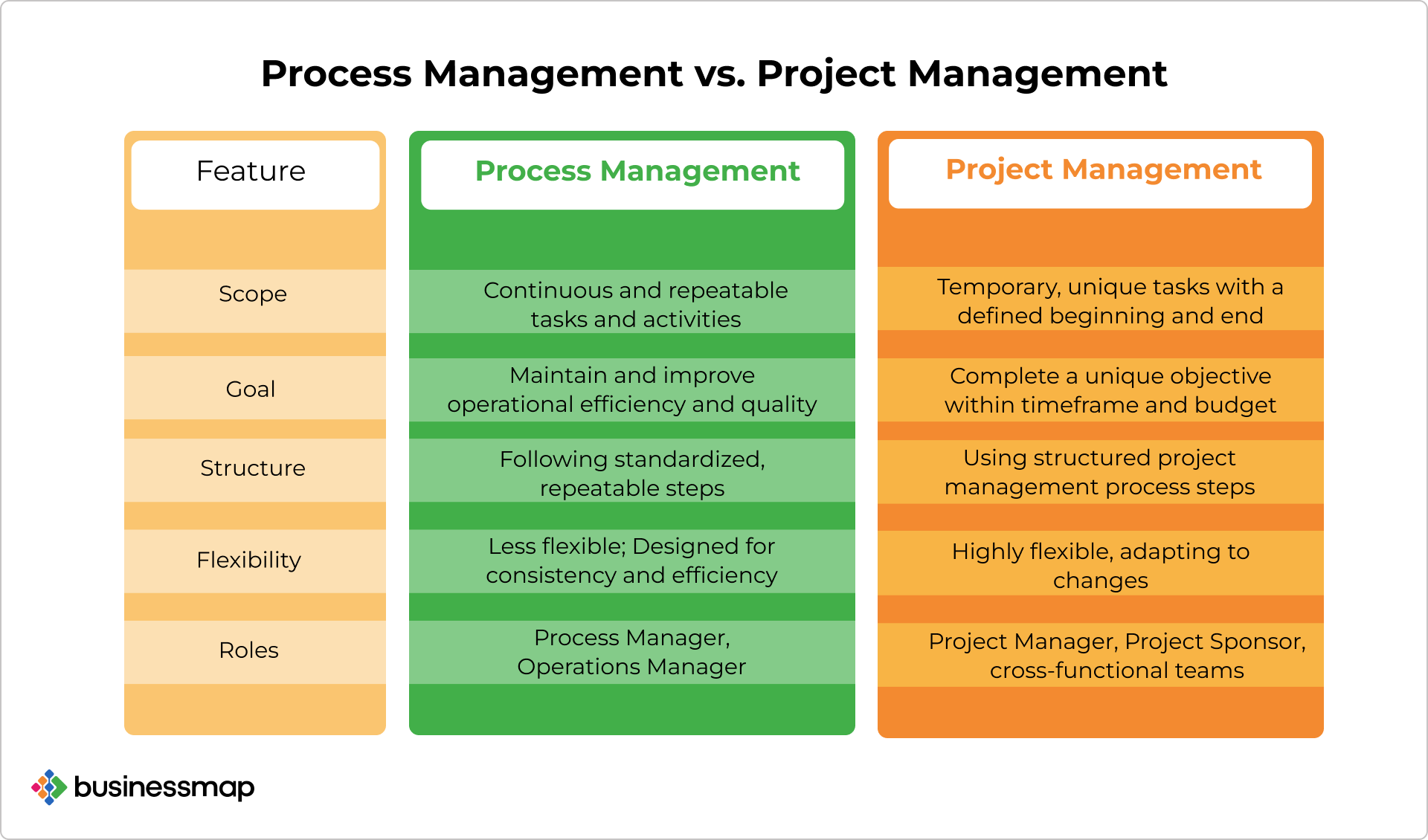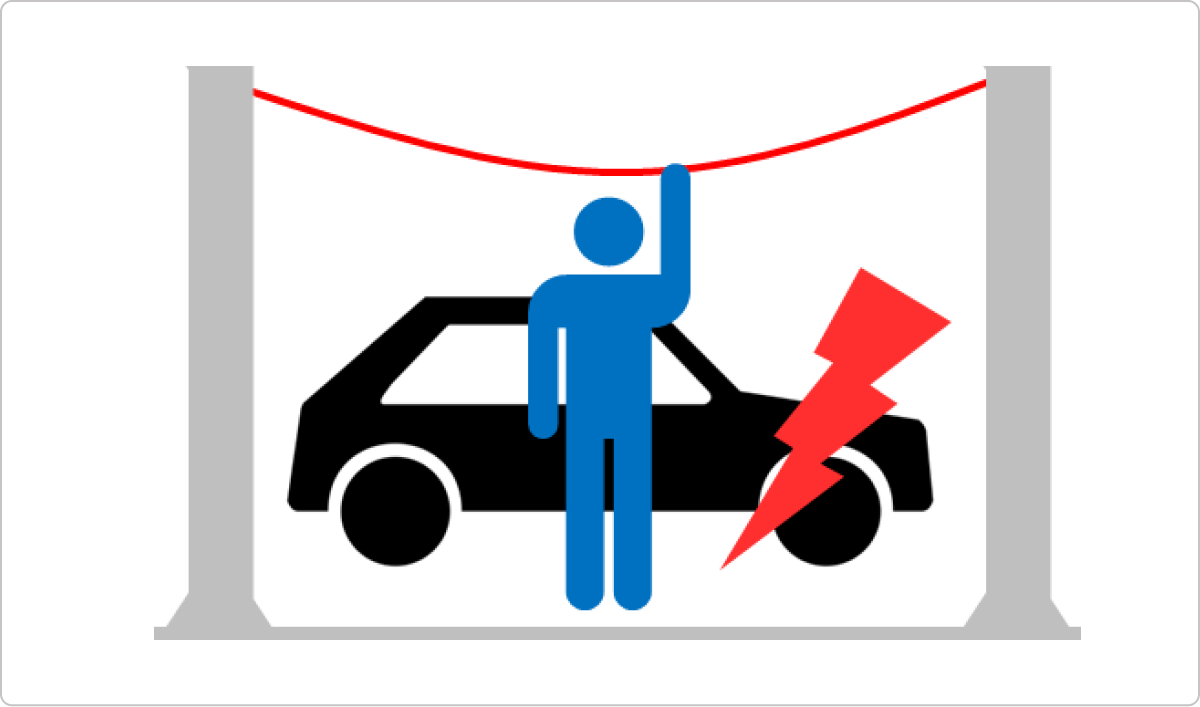Think of a sports team. To succeed, they need a solid game plan (their process) and the ability to adapt to unique plays or matches (their projects). The process is like their regular training, drills, and play strategies, keeping the team sharp and consistent. Meanwhile, projects are like preparing for a championship game or making key adjustments for a specific opponent.
Today's success often hinges on an organization's ability to manage both ongoing operations and unique initiatives effectively. The two essential disciplines capturing this distinction are process management and project management.
While process management focuses on streamlining recurring tasks to achieve consistent and repeatable results, project management is about planning and executing time-bound endeavors to reach specific goals within set constraints. Understanding these two areas is crucial for optimizing productivity, minimizing risks, and aligning resources with your organization's strategic goals. Let's find out more.
Process Management vs. Project Management: A Closer Look
Process management is the systematic approach of managing a series of interrelated tasks that together fulfill a recurring organizational goal. These tasks follow a structured sequence to ensure quality and consistency, transforming inputs into reliable outputs. For instance, package sorting in a shipping facility follows a systematic process to route items accurately and quickly, enabling timely customer deliveries. Process management is about managing that process successfully and continuously improving it.
From its side, project management is focused on achieving a unique outcome within a specific timeline and budget. Projects are temporary and goal-oriented, like upgrading software or launching a marketing campaign, with each project ending once its objectives are met. Project management deals with unique challenges, requiring distinct planning, resource allocation, and coordination for the successful delivery of specific products or services.
Key Distinctions Between Process and Project Management
Let's explore how the two disciplines apply in real-world scenarios like supply chain operations and product launches.
Process Management: Definition and Scope
As discussed, process management involves the continuous, structured approach of overseeing and optimizing related activities to achieve a specific, recurring company goal. In a supply chain management context, this might include the end-to-end logistics of sourcing raw materials, managing inventory, coordinating transportation, and ensuring product delivery to the end customer. Each step in this process aims to maintain consistency, minimize costs, and improve overall efficiency, all while ensuring products are delivered on time and meet quality standards.
Key Features of Process Management
-
Consistency and Standardization: Process management in supply chain operations ensures each step is standardized to maintain consistent product quality and minimize outcome variability.
-
Efficiency and Cost Control: Process management aims to reduce costs, avoid delays, and eliminate redundancies by continuously assessing and optimizing each stage. Automation and data-driven insights are often used to streamline inventory management, demand forecasting, and supplier coordination.
-
Ongoing Improvement: Unlike a project with a defined end, process management is ongoing. This might involve periodic assessments and optimizations in warehousing, route planning, or supplier partnerships to respond to the supply chain's evolving market demands and operational challenges.

Project Management: Definition and Scope
Project management focuses on the temporary, structured effort to achieve a unique outcome within a specific timeframe and budget. In the case of a product launch, this could involve coordinating various teams for market research, product design, marketing strategy, and distribution planning, all leading up to the release date. Each project outcome or deliverable is planned, scheduled, and executed to meet the project's goals and successfully deliver the product to market.
Key Features of Project Management
-
Clear Goals and Timeline: Project management emphasizes specific objectives and deadlines, as each task within the product launch must align with the release date. Key performance indicators (KPIs) are set to measure success at each stage, from design milestones to marketing campaign launches.
-
Resource Allocation and Budgeting: Effective project management in a product launch involves detailed planning of resources, such as assigning team members, allocating budget for promotions, and managing dependencies in the project between design, production, and marketing.
-
Temporary and Unique: Unlike process management, project management is temporary, concluding once the product is launched. Each product launch project is unique, with distinct challenges and outcomes tailored to the market, customer preferences, and competitive landscape.
| Feature |
Process Management |
Project Management |
| 1. Scope |
Continuous, ongoing, and repeatable tasks and activities to achieve consistency and efficiency |
Temporary, unique tasks with a defined beginning and end to achieve a specific outcome |
| 2. Goal |
To maintain and improve the efficiency, quality, and consistency of operations |
To complete a unique deliverable within specified constraints |
| 3. Key Structure Characteristics |
Standardized, repeatable steps focused on achieving a consistent outcome each time the process is followed |
Structured project management process phases, including planning, execution, monitoring, and closing, focused on achieving unique results |
| 4. Key Benefits |
Increases productivity, reduces errors, and provides stability and quality assurance in regular operations |
Enables innovation, flexibility, and targeted resource allocation for achieving unique goals |
| 5. Flexibility |
Generally less flexible; designed for efficiency and consistency across repeated executions |
Highly flexible, adapting to changes in scope, or resources based on project-specific needs |
| 6. Roles |
Roles are often stable and specific, such as Process Manager or Operations Manager, focused on optimization |
Roles vary by project, including Project Manager, Project Sponsor, and cross-functional team members |
Is Process or Project Management Right for Your Business? 3 Key Factors to Consider
Deciding between process and project management depends on your specific needs, whether aiming for ongoing efficiency or tackling a one-time objective. Here's how to determine which one might be right for you:
1. Understand the Nature of Your Work: Repetitive or Unique?
Processes are repetitive and structured. Implementing a process like collecting customer information is designed to yield the same outcome regardless of who performs it. For example, when adding customer data to our CRM system, we follow the same steps to ensure consistency, even as new customers are added or information is updated.
On the other hand, projects are temporary efforts to achieve a unique result. Launching a new CRM platform would be considered a project because it's a one-time goal with a distinct outcome. Even if you follow steps similar to other project process blueprints, each project will bring its own challenges and result in a unique outcome.
2. Evaluate Your Goals: Continuous Improvement or Specific Objective?
Processes keep your routine activities running smoothly - efficiently, consistently, and error-free. Projects, conversely, are all about achieving a unique result and wrapping up once that goal is met. Unlike processes, projects need focused planning, budgeting, and coordination to tackle specific objectives within a set timeframe.
3. Recognize the Overlap
In many cases, processes and projects overlap and support each other. For instance, building a new CRM system is a project, but maintaining the data within it is a process. Both management styles are essential for the bigger picture: while projects bring innovation, processes maintain stability and consistency. Balancing both can unlock your business innovation spree through projects while maintaining efficiency and reliability through processes.
Balancing Process and Project Management in Practice
The real magic of success in balancing process and project management lies in knowing when to prioritize consistency and when to embrace change. Take manufacturing as an example.
Process management here is all about keeping production smooth and predictable. Toyota's Production System (TPS), with its Andon system, is a classic case. If a defect shows up on the production line, Andon lets workers "stop the line" to fix the issue right away, preventing small problems from becoming big ones down the line. This process-focused approach ensures each product meets strict quality standards, reduces waste, and keeps operations efficient and reliable.
 Image by Christoph Roser at AllAboutLean.com under the free CC-BY-SA 4.0 license
Image by Christoph Roser at AllAboutLean.com under the free CC-BY-SA 4.0 license
On the flip side, project management in manufacturing comes into play when making unique improvements - like upgrading the Andon system or introducing other Lean methods for improvement. These projects are one-time efforts with clear goals, resources, and deadlines. These two approaches keep manufacturing running smoothly while allowing continuous growth and innovation.
Process Management vs. Project Management: Examples
Here are five projects and their corresponding processes to illustrate the distinction between projects and processes.
| Project |
Process |
| Developing a Customer Feedback System |
Collecting and analyzing customer feedback |
| Integrating an ERP System |
Managing procurement requests through the ERP |
| Upgrading IT Infrastructure |
Routine maintenance and system monitoring |
| Managing Content Creation and Approval |
Launching a new marketing campaign |
| Opening a New Retail Store Location |
Inventory replenishment and stock management |
As you can see, projects deliver unique, time-bound objectives, whereas processes support regular operations that ensure consistent outcomes.
Businessmap is the most flexible software
to align work with company goals






 Image by Christoph Roser at
Image by Christoph Roser at 

